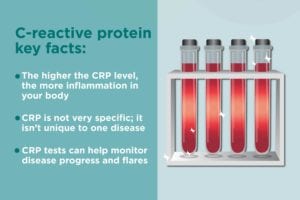

There’s no single test that can give a definitive diagnosis for rheumatoid arthritis and other autoimmune arthritis. In addition to blood tests that measure inflammation, such as the CRP test, and antibodies, rheumatologists look at factors like physical symptoms and imaging, such as X-rays and MRIs. Doctors put these factors together to make a clinical diagnosis, which means they look at the big picture of the disease, rather than a relying on a single test result.
The C-reactive protein (CRP) test is one of many blood tests your doctor might order for to help make your diagnosis and throughout your treatment. Here’s what the CRP blood test can — and can’t — reveal about your condition.
What Is C-Reactive Protein?
Inflammation in the body triggers the liver to create C-reactive proteins, says Stuart D. Kaplan, MD, chief of rheumatology at South Nassau Communities Hospital in Oceanside, New York. Doctors can measure the amount of those proteins through a blood test. The higher the levels of CRP they find, the higher the inflammation in the body.
What Do the Results of a CRP Blood Test Mean?
Above 10 milligrams per liter is considered high, which signals a concerning level of inflammation in the body, according to the Mayo Clinic. A doctor will then need to use other lab tests, imaging, and observing clinical symptoms to figure out where the inflammation is coming from.
How Sensitive and Specific Is the CRP Test?
The CRP test is not very specific, which means it isn’t unique to one disease. Sure, high levels could be a signal of autoimmune disease, but CRP levels could also be elevated because of infection, heart disease, or other health issues. A potential benefit of CRP over the sedimentation rate test, a similar test of inflammation, is that it’s “not quite as fickle,” says Dr. Kaplan. CRP is more sensitive, which means that a patient with autoimmune disease is more likely to test positive.
What Diseases Does the CRP Test Help Diagnose?
With autoimmune disease, the body is treating healthy cells like invaders. That reaction causes inflammation, so high CRP levels tick one box for an autoimmune diagnosis. But that’s just the tip of the iceberg. “The CRP will go up pretty much from any inflammation, which can be from infection or an inflammatory condition like rheumatoid arthritis, or even atherosclerosis,” says Dr. Kaplan.
Doctors often use a version called a high-sensitivity C-reactive protein (hs-CRP) test to examine heart disease risk — in fact, a study of more than 15,000 women found that hs-CRP was a better predictor of stroke than “bad” LDL cholesterol was.
What Diseases Does the CRP Test Help Rule Out?
CRP tests don’t automatically rule out any diseases, but they can lead rheumatologists in the right direction. A low CRP result would suggest that the symptoms probably don’t come from an autoimmune condition like rheumatoid arthritis, says Dr. Kaplan, but doctors would need to check other factors for confirmation. “You have to look at the whole picture — you can’t diagnose based on just one particular test,” says Dr. Kaplan.
How Do Doctors Use the CRP Test to Monitor Your Disease?
As rheumatologists follow a patients’ progress through treatment, inflammation levels can tell them how active the disease is. “The CRP gives you something to follow to see if the inflammation is high,” says Dr. Kaplan. During flare-ups, CRP will be higher, so it’s a good gauge of whether your current treatment regimen is effective.
Keep Reading
Subscribe to CreakyJoints
Get the latest arthritis news in your inbox. Sign up for CreakyJoints and hear about the latest research updates and medical news that could affect you.





